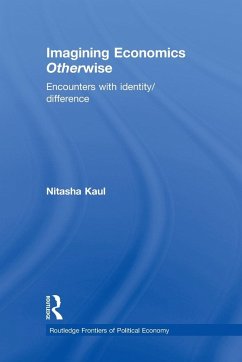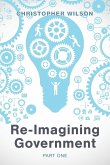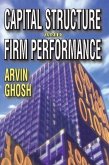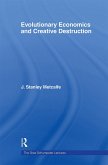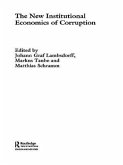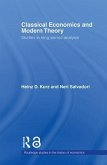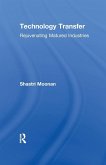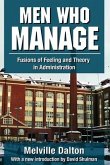- Broschiertes Buch
- Merkliste
- Auf die Merkliste
- Bewerten Bewerten
- Teilen
- Produkt teilen
- Produkterinnerung
- Produkterinnerung
The result of a multifaceted investigation into the nature of knowledge produced by economics, this book re-examines certain understood ways of thinking about economics as a discipline, especially in relation to questions of identity and difference.
Andere Kunden interessierten sich auch für
![Re-Imagining Government Re-Imagining Government]() Christopher WilsonRe-Imagining Government20,99 €
Christopher WilsonRe-Imagining Government20,99 €![Capital Structure and Firm Performance Capital Structure and Firm Performance]() Arvin GhoshCapital Structure and Firm Performance64,99 €
Arvin GhoshCapital Structure and Firm Performance64,99 €![Evolutionary Economics and Creative Destruction Evolutionary Economics and Creative Destruction]() Stanley J. Metcalfe (ed.)Evolutionary Economics and Creative Destruction80,99 €
Stanley J. Metcalfe (ed.)Evolutionary Economics and Creative Destruction80,99 €![The New Institutional Economics of Corruption The New Institutional Economics of Corruption]() Johann Graf LambsdorffThe New Institutional Economics of Corruption65,99 €
Johann Graf LambsdorffThe New Institutional Economics of Corruption65,99 €![Classical Economics and Modern Theory Classical Economics and Modern Theory]() Heinz D. KurzClassical Economics and Modern Theory77,99 €
Heinz D. KurzClassical Economics and Modern Theory77,99 €![Technology Transfer Technology Transfer]() Shastri MoonanTechnology Transfer32,99 €
Shastri MoonanTechnology Transfer32,99 €![Men Who Manage Men Who Manage]() Melville DaltonMen Who Manage68,99 €
Melville DaltonMen Who Manage68,99 €-
-
-
The result of a multifaceted investigation into the nature of knowledge produced by economics, this book re-examines certain understood ways of thinking about economics as a discipline, especially in relation to questions of identity and difference.
Hinweis: Dieser Artikel kann nur an eine deutsche Lieferadresse ausgeliefert werden.
Hinweis: Dieser Artikel kann nur an eine deutsche Lieferadresse ausgeliefert werden.
Produktdetails
- Produktdetails
- Verlag: Routledge
- Seitenzahl: 302
- Erscheinungstermin: 17. April 2010
- Englisch
- Abmessung: 234mm x 156mm x 16mm
- Gewicht: 462g
- ISBN-13: 9780415589499
- ISBN-10: 0415589495
- Artikelnr.: 54572070
- Herstellerkennzeichnung
- Libri GmbH
- Europaallee 1
- 36244 Bad Hersfeld
- gpsr@libri.de
- Verlag: Routledge
- Seitenzahl: 302
- Erscheinungstermin: 17. April 2010
- Englisch
- Abmessung: 234mm x 156mm x 16mm
- Gewicht: 462g
- ISBN-13: 9780415589499
- ISBN-10: 0415589495
- Artikelnr.: 54572070
- Herstellerkennzeichnung
- Libri GmbH
- Europaallee 1
- 36244 Bad Hersfeld
- gpsr@libri.de
Nitasha Kaul is an economist, novelist, theorist, poet. She has a joint doctorate in Economics and Philosophy and was previously a tenured Lecturer (Assistant Professor) in Economics department at the Bristol Business School. She is currently a Visiting Fellow at the Centre for the Study of Democracy, University of Westminster in London, and an Associate Professor in Creative Writing at the Royal Thimphu College in Bhutan. She speaks?within and outside academia, and has published books, essays in edited volumes, journal articles, and newspaper comments on the diverse themes of identity, economics, critical social theory, democracy, technology, gender, civic governmentality, and politics of knowledge production. Her novel Residue was shortlisted for the Man Asian Literary Prize in 2009.?Her next book is a scholarly monograph on the history, politics, and economy of Bhutan, the land of Gross National Happiness (GNH).?
Part 1: Looking Back Looking Ahead 1. Introduction 1.1 Introduction 1.2 The
Writing of Theory in Economics 1.3 The Overview 1.4 Signpost Part 2:
Rooting and Routing Economics 2. Enlightenment Epistemology and the
Subject-World of Economics 2.1 Introduction 2.2 Enterprise of Economics 2.3
Enlightenment and Epistemology 2.4 Subject-World of Economics 2.5 The
Theory and Science of Economics 2.6 Mathematical Formalism, Representation
and the Moralisation of Objectivity 2.7 Conclusion Part 3: Issues of
Knowledge and Difference 3. Modernist Rendition of Knowledge and the
Question of Difference 3.1 Introduction 3.2 Time and the Other of Modernist
Knowledge 3.3 Rousseau's Discourse On Political Economy 3.4 Subjectivity of
Modernist Knowledge and the Transcendental Pretence 3.5 Reason, History and
the Hegelian Dialectic 3.6 Human Nature and the Question of Difference 3.7
The Postcolonial Moment in Epistemology 3.8 Conclusion Part 4: Juxtaposing
Questions of Identity and the Economic 4. Identity Problematics 4.1 On
Identity 4.2 Abstract Essentialist Individual Identity 4.3 Critiquing the
Abstract Essentialist Individual View of Identity 4.4 The Orthodox and the
Heterodox: A Possible Dialogue 4.5 Rethinking the Relation of Identity and
Difference in Knowledge 4.6 The Politics of Identity 5. Economics and
Identity 5.1 Expanding 'Economics Inc.' (Economics Incorporated)? 5.2
Illustration One: Akerlof and Kranton on 'Economics and Identity' 5.3
Illustration Two: Sen On 'Reason Before Identity' 6. Rethinking Identity
Translationally and Reconsidering the Economic 6.1 Introduction 6.2
Concentric and Translational Architectures of Identity 6.3 Identity :
Economic: Culture: Economy 6.4 Conclusion Part 5: In Conclusion 7. Writing
Economic Theory Another Way 7.1 A Recap 7.2 Writing Economic Theory Another
Way 7.3 Pedagogy Re-Visited: Contextual Social Political Economices 7.4
Conclusion: Penpoints On Mirrors
Writing of Theory in Economics 1.3 The Overview 1.4 Signpost Part 2:
Rooting and Routing Economics 2. Enlightenment Epistemology and the
Subject-World of Economics 2.1 Introduction 2.2 Enterprise of Economics 2.3
Enlightenment and Epistemology 2.4 Subject-World of Economics 2.5 The
Theory and Science of Economics 2.6 Mathematical Formalism, Representation
and the Moralisation of Objectivity 2.7 Conclusion Part 3: Issues of
Knowledge and Difference 3. Modernist Rendition of Knowledge and the
Question of Difference 3.1 Introduction 3.2 Time and the Other of Modernist
Knowledge 3.3 Rousseau's Discourse On Political Economy 3.4 Subjectivity of
Modernist Knowledge and the Transcendental Pretence 3.5 Reason, History and
the Hegelian Dialectic 3.6 Human Nature and the Question of Difference 3.7
The Postcolonial Moment in Epistemology 3.8 Conclusion Part 4: Juxtaposing
Questions of Identity and the Economic 4. Identity Problematics 4.1 On
Identity 4.2 Abstract Essentialist Individual Identity 4.3 Critiquing the
Abstract Essentialist Individual View of Identity 4.4 The Orthodox and the
Heterodox: A Possible Dialogue 4.5 Rethinking the Relation of Identity and
Difference in Knowledge 4.6 The Politics of Identity 5. Economics and
Identity 5.1 Expanding 'Economics Inc.' (Economics Incorporated)? 5.2
Illustration One: Akerlof and Kranton on 'Economics and Identity' 5.3
Illustration Two: Sen On 'Reason Before Identity' 6. Rethinking Identity
Translationally and Reconsidering the Economic 6.1 Introduction 6.2
Concentric and Translational Architectures of Identity 6.3 Identity :
Economic: Culture: Economy 6.4 Conclusion Part 5: In Conclusion 7. Writing
Economic Theory Another Way 7.1 A Recap 7.2 Writing Economic Theory Another
Way 7.3 Pedagogy Re-Visited: Contextual Social Political Economices 7.4
Conclusion: Penpoints On Mirrors
Part 1: Looking Back Looking Ahead 1. Introduction 1.1 Introduction 1.2 The
Writing of Theory in Economics 1.3 The Overview 1.4 Signpost Part 2:
Rooting and Routing Economics 2. Enlightenment Epistemology and the
Subject-World of Economics 2.1 Introduction 2.2 Enterprise of Economics 2.3
Enlightenment and Epistemology 2.4 Subject-World of Economics 2.5 The
Theory and Science of Economics 2.6 Mathematical Formalism, Representation
and the Moralisation of Objectivity 2.7 Conclusion Part 3: Issues of
Knowledge and Difference 3. Modernist Rendition of Knowledge and the
Question of Difference 3.1 Introduction 3.2 Time and the Other of Modernist
Knowledge 3.3 Rousseau's Discourse On Political Economy 3.4 Subjectivity of
Modernist Knowledge and the Transcendental Pretence 3.5 Reason, History and
the Hegelian Dialectic 3.6 Human Nature and the Question of Difference 3.7
The Postcolonial Moment in Epistemology 3.8 Conclusion Part 4: Juxtaposing
Questions of Identity and the Economic 4. Identity Problematics 4.1 On
Identity 4.2 Abstract Essentialist Individual Identity 4.3 Critiquing the
Abstract Essentialist Individual View of Identity 4.4 The Orthodox and the
Heterodox: A Possible Dialogue 4.5 Rethinking the Relation of Identity and
Difference in Knowledge 4.6 The Politics of Identity 5. Economics and
Identity 5.1 Expanding 'Economics Inc.' (Economics Incorporated)? 5.2
Illustration One: Akerlof and Kranton on 'Economics and Identity' 5.3
Illustration Two: Sen On 'Reason Before Identity' 6. Rethinking Identity
Translationally and Reconsidering the Economic 6.1 Introduction 6.2
Concentric and Translational Architectures of Identity 6.3 Identity :
Economic: Culture: Economy 6.4 Conclusion Part 5: In Conclusion 7. Writing
Economic Theory Another Way 7.1 A Recap 7.2 Writing Economic Theory Another
Way 7.3 Pedagogy Re-Visited: Contextual Social Political Economices 7.4
Conclusion: Penpoints On Mirrors
Writing of Theory in Economics 1.3 The Overview 1.4 Signpost Part 2:
Rooting and Routing Economics 2. Enlightenment Epistemology and the
Subject-World of Economics 2.1 Introduction 2.2 Enterprise of Economics 2.3
Enlightenment and Epistemology 2.4 Subject-World of Economics 2.5 The
Theory and Science of Economics 2.6 Mathematical Formalism, Representation
and the Moralisation of Objectivity 2.7 Conclusion Part 3: Issues of
Knowledge and Difference 3. Modernist Rendition of Knowledge and the
Question of Difference 3.1 Introduction 3.2 Time and the Other of Modernist
Knowledge 3.3 Rousseau's Discourse On Political Economy 3.4 Subjectivity of
Modernist Knowledge and the Transcendental Pretence 3.5 Reason, History and
the Hegelian Dialectic 3.6 Human Nature and the Question of Difference 3.7
The Postcolonial Moment in Epistemology 3.8 Conclusion Part 4: Juxtaposing
Questions of Identity and the Economic 4. Identity Problematics 4.1 On
Identity 4.2 Abstract Essentialist Individual Identity 4.3 Critiquing the
Abstract Essentialist Individual View of Identity 4.4 The Orthodox and the
Heterodox: A Possible Dialogue 4.5 Rethinking the Relation of Identity and
Difference in Knowledge 4.6 The Politics of Identity 5. Economics and
Identity 5.1 Expanding 'Economics Inc.' (Economics Incorporated)? 5.2
Illustration One: Akerlof and Kranton on 'Economics and Identity' 5.3
Illustration Two: Sen On 'Reason Before Identity' 6. Rethinking Identity
Translationally and Reconsidering the Economic 6.1 Introduction 6.2
Concentric and Translational Architectures of Identity 6.3 Identity :
Economic: Culture: Economy 6.4 Conclusion Part 5: In Conclusion 7. Writing
Economic Theory Another Way 7.1 A Recap 7.2 Writing Economic Theory Another
Way 7.3 Pedagogy Re-Visited: Contextual Social Political Economices 7.4
Conclusion: Penpoints On Mirrors

